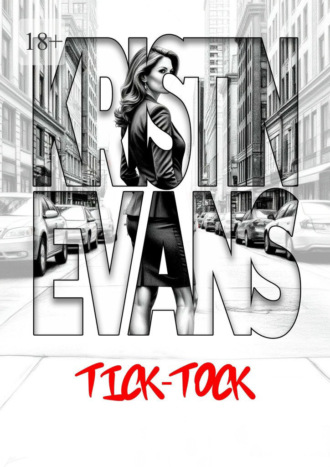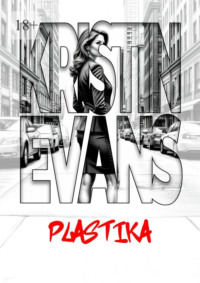
Полная версия
Tick-Tock

Tick-Tock
Kristin Evans
© Kristin Evans, 2025
ISBN 978-5-0068-0129-5
Created with Ridero smart publishing system
Kristin Evans
Tick-Tock
Chapter 1: The Diamond Mirage
The air in the twentieth-floor conference room hummed with a blend of tension, expensive perfume, and the aroma of freshly brewed espresso. On the large screen, flawless slides seamlessly gave way to one another – growth charts, brand logos, inspirational quotes. And at the center of this whirlwind, standing at the podium, was her. Nastya.
Her voice, steady and confident, filled the space, mesmerizing the audience. Every word was precise, every gesture polished to perfection. Dressed in an expensive, minimalist suit the color of sea green, with impeccable hair and makeup, she was the embodiment of success, a living illustration for a presentation titled «How to Conquer the World.»
«Real-time data integration will allow us not just to react to market changes, but to anticipate them,» she was saying, her gaze gliding over the faces of the important shareholders, catching their nods of approval. «We are creating not just a campaign; we are creating a new standard.»
Her bosses’ eyes radiated absolute trust. Her male colleagues looked on with a respect tinged with envy. The project she had worked on without a single day off for the last three months was her brainchild, her baby. And now that baby was taking its first confident steps, and the room was applauding it. Applauding her.
This should have been it – the moment of triumph. The very moment she had burned herself out at work for years to achieve, had sacrificed her personal life for career advancement, had stayed late night after night, proving to everyone and herself that she was worth something. A sweet lump of happiness should have been rising in her throat, her heart should have been leaping out of her chest with pride.
But there was only emptiness.
The applause merged into a dull roar, like the sound of surf somewhere far, far away. The smiles, handshakes, pats on the back – it all felt like it was happening through thick glass. Nastya smiled automatically, thanked everyone, accepted the compliments, but her thoughts were elsewhere. Or rather, nowhere. They were just drifting away, leaving behind a strange, ringing silence.
«Nastya, brilliant!» A firm handshake from Vadim, the Director of Development. His fingers were cool and hard, like polished wood. «I never doubted it. This contract is ours. We absolutely must celebrate tonight.»
«Thank you, Vadim,» her voice sounded foreign even to her own ears. «The team worked hard.»
«I saw the team. But I also saw who was leading it,» he gave her a meaningful smile, and his gaze lingered on her a moment longer than necessary. The gaze of an appraiser. A gaze that held not just professional interest. It was the look of a man who was already calculating whether this particular piece would fit into his perfectly constructed life.
Nastya politely looked away.
The congratulations lasted another good half hour. Finally, the room emptied, leaving behind the smell of coffee, paper, and faint exhaustion. Nastya was left alone before a huge panoramic window overlooking the evening metropolis. Myriad lights, speeding cars, tiny people below. She was standing on top of the world. Literally. She looked down at this city boiling with life and felt utterly, completely alone.
This feeling had been washing over her more and more often lately. It came at night, in her spacious, quiet bedroom, where the only sound was the steady hum of the air conditioner. It caught up with her on Friday evenings when she ordered sushi for one and watched a series, careful not to spill crumbs on the perfectly clean sofa. It was with her now, at the peak of her professional success.
She reached for her phone. Instinctively, automatically, like grabbing for a life raft. The bright screen blinded her in the semi-darkness of the hall. Social media. Smiling faces. Dozens, hundreds of smiling faces.
Katya, a friend from university. A photo with two kids in an apple orchard. The little ones, squinting in the sun, wearing tiny overalls. Caption: «My greatest happiness! Thank you, my beloved man, for this day!» Hashtags: #family #kids #happinessisreal.
Masha, a former colleague. A wedding photo. A white dress, tears of joy in her eyes, a look full of adoration for the man gazing proudly at her. Hashtags: #love #myhusband #anewbeginning.
Even Olga, who had always been a fierce careerist and laughed at the «baby brains» of those on maternity leave, had posted a picture: her hand with a manicure resting on a noticeably rounded belly. Hashtag: #awaitingamiracle.
Each photo was like a small prick from a fine, sharp needle. Deep down, beneath the layers of fatigue and self-control, something aching and sore stirred and demanded attention. Something that whispered: «And what about your miracle? Your happiness?»
She sharply turned off the screen. The silence deafened her once more. The city lights now seemed not a symbol of success, but millions of alien windows behind which other lives were being lived – dinners were being cooked, children were laughing, lovers were fighting and making up. And outside her window, there was only silence.
She gathered her things, turned off the lights in the hall, and stepped into the deserted corridor, gleaming under the cold light of LED lamps. Her heels beat a clear, lonely rhythm on the polished granite floor. It was the sound of her success. The sound of her loneliness.
The elevator descended smoothly and silently to the underground parking garage. Getting into her car, she paused for a moment to study her reflection in the dark glass. A beautiful woman. A successful woman. A tired woman with empty eyes.
The drive home blurred into a streak of streetlights and headlights. She didn’t turn on the music. She drove in silence, broken only by the whisper of tires on asphalt.
Her apartment greeted her with its usual sterile coolness. Designer renovation, expensive furniture, all shades of beige and gray. Everything was perfect, meticulous, like in a magazine. And utterly lifeless. Not a single extraneous object, not a speck of dust, not a single random spark of the chaos from which life is born.
She kicked off her shoes without neatly placing them in the closet – an unthinkable breach of her own rules – and walked into the kitchen. Mechanically, she poured herself a glass of red wine without even looking at the label. She took a sip. The tart taste spread over her tongue but brought no relaxation, no pleasure.
And at that moment, the phone rang. Mom. Nastya squeezed her eyes shut for a second, gathering her strength. She knew what this conversation would be about.
«Nastenka, my dear girl! So? How did your presentation go?» her mother’s voice sounded bright and excited.
«Everything went well, Mom. We got the contract.»
«Oh, you clever girl! I knew it! Of course, who could ever beat my daughter!» There was legitimate pride in her voice. «Congratulations! You’re a real big shot now!»
Nastya could feel the «but» coming. It hung in the air, heavy and unspoken.
«Thanks, Mom.»
«You’re probably going to celebrate now? With the team?» her mother’s voice held a faint but clear hope.
«No, Mom. I’m home. I’m just dead tired.»
A short but eloquent silence hung on the other end of the line. Disappointment.
«All alone? You should have gone out… Maybe one of the men invited you? To celebrate such a success!» Her mother tried to sound light, but the falseness was palpable.
«No one invited me, Mom. Everyone came to work, not to socialize.»
«Oh, Nastyusha…» her mother’s voice softened, a note of anxiety creeping in. «You have everything: a career, beauty, an apartment… All you need is a good husband and a little one. Otherwise, you’re just running around buried in work, and life is passing you by. Look at Katyusha, remember her from the next building? She just had her third… And you’re already thirty-five…»
Nastya’s heart constricted. A direct hit. As always.
«Mom, please, don’t start. I’m tired.»
«I’m not starting! I’m just worried as your mother. Time waits for no one. Your biological clock is ticking. You might meet a wonderful man, but it could already be too late… Just think about that.»
«Biological clock.» The phrase affected her like a red rag to a bull. It reduced her from a person to a walking reproductive organ with an expiration date.
«Mom, I’ll think about it. I need to rest. I’ll call you tomorrow, okay?»
«Okay, okay, rest, my dear. Congratulations again on your success. Love you.»
Nastya hung up and pushed the phone away as if it were red-hot. She walked over to the huge, floor-to-ceiling window. The city bustled below. Somewhere out there were Katya with her kids, Masha with her husband, Olga with her belly. And she was standing here, alone, in her perfect, measured, empty cage on the twentieth floor.
She pressed her palm against the cold glass. The wine in her glass trembled slightly. She caught her reflection in the dark glass – blurred, lonely, frozen between two worlds: the bright, noisy world outside and the quiet, lifeless one within.
The triumph had passed, leaving behind a bittersweet aftertaste and a nagging sense of loss for something very important. Something that couldn’t be bought with money or won with contracts. Loneliness enveloped her, thick and heavy, like a velvet cloak.
She took another sip of wine. «Biological clock is ticking,» her mother’s voice echoed in her head. And in the silence of the luxurious apartment, she suddenly fancied she could hear that sound – quiet, persistent, relentless. Tick-tock. Tick-tock. Tick-tock.
It beat in time with her own heart, counting out the seconds of her impeccable, successful, and profoundly lonely life.
Chapter 2: The Wake-Up Call
The morning began with the coffee machine breaking. It didn’t just refuse to work; it let out a pathetic hissing sound and spat a stream of murky brown liquid onto the polished concrete countertop, something more resembling mud than espresso. For Nastya, this wasn’t a minor domestic annoyance but an ominous sign. The coffee machine was as much a tuned and predictable element of her universe as her meeting schedule and her nightly skincare routine. Its failure introduced chaos into a perfect order already shaken by the previous evening.
She irritably poked at the buttons, trying to reboot the machine, but it only wheezed in response. Tick-tock, the sound suddenly echoed in her head. Stupid. Absurd. But she heard that obsessive, steady rhythm distinctly.
«Dammit,» she swore quietly, stepping away from the treacherously silent machine.
A headache, dull and persistent, reminded her of yesterday’s glass of wine and the sleepless night spent grinding the same thoughts over and over. Today was Marina’s birthday, her friend from university. Marina was one of those who had chosen «family» right after graduation. And now, ten years later, she had two children, a lawyer husband, and a life that on social media resembled an idyllic postcard: homemade cookies, family trips, a cozy house with a fireplace.
Nastya hated these visits to her settled friends. It was like a tour of a parallel universe where she felt like an alien, a black sheep, a creature with incorrectly tuned instincts. But she couldn’t refuse. Marina would be offended and would then spend a month with the hurt look of a martyr whose «former careerist friend» had scorned her.
She tried to make coffee in a cezve but in her agitation, she over-peppered it and nearly spilled boiling water on her hand. Everything was slipping from her grasp. Nerves. Damned nerves.
An hour later, standing in front of the mirror in her spacious walk-in closet, she caught herself choosing an outfit for this visit like donning armor. What to wear to not look too formal? Too rich? Too lonely? She finally settled on expensive but deliberately simple jeans, a cashmere sweater, and sneakers from a trendy designer. A mask of casualness costing half her assistant’s monthly salary.
The drive to Marina’s country house took over an hour. The further she got from the center, from glass and concrete, the tighter the unpleasant feeling in her chest squeezed. Her SUV, perfect for the city, seemed overly pampered and out of place among the practical minivans and used foreign cars.
Marina’s house, as expected, looked like a gingerbread house: a neat lawn, a swing in the yard, a toy truck forgotten under the porch. From an open window came the shrieks of children and the smell of something homemade and sweet. Nastya froze in the car for a second, gathering her courage, inhaling the scent of someone else’s, yet so correct, happiness. Again, she thought she heard ticking. She shook her head. Paranoia.
She was met by a whirlwind of sounds. The delighted screams of two little rascals racing down the hallway, the barking of some small shaggy dog, Marina’s voice shouting from the kitchen: «Stop running! Say hello to Auntie Nastya!»
Marina ran out into the hallway, covered in flour, with rosy cheeks and shining eyes. She hugged Nastya so tightly it knocked the wind out of her.
«Nastyusha! You made it! Wonderful! Kids, come here, look what a beautiful friend has come to see me!»
The children, six and four years old, stopped and stared at her like she was an alien. The older one, Yegor, asked:
«Did you bring us anything?»
«Yegor! Shame on you!» Marina exclaimed, but her eyes showed approval. This was how it was supposed to be. Auntie Nastya was a fairy-tale rich fairy who always brought cool gifts.
Nastya handed over two bright bags. She had stopped at the most expensive children’s store in the city and, with a consultant’s help, bought the latest model building set and a huge interactive doll. The kids snatched the gifts with squeals and ran off without even saying «thank you.»
«Oh, Nast, you shouldn’t have spent so much!» Marina shook her head, but it was clear she was flattered. «Come into the living room, I’ll pour some tea. Kirill is on the couch watching football, keep him company.»
Kirill, Marina’s husband, lazily raised a hand in greeting without taking his eyes off the screen. «Caveman,» Nastya thought. He was always a man of few words and perceived Nastya’s visits as a necessary evil.
Nastya perched on the edge of the couch, feeling out of place. Her perfect jeans seemed specially created for another context. Here, among children’s socks, scattered magazines, and juice stains on the carpet, she looked like an exhibit from a modern art museum that had accidentally ended up at a flea market.
«So, how are things?» Marina shouted from the kitchen. «How was yesterday’s triumph? Did everything go well?»
«Yes, thanks, everything’s great,» Nastya replied, trying to sound cheerful. «We got the contract.»
«Good for you!» an approving cry came back. «Sometimes, sitting here with the kids, it feels like real life is boiling away out there in the big city without you!»
There was a slight reproach in that. Like, we’re here, and you’re out there in the real world. Nastya wanted to object that this was the real life – this chaos, these screams, this smell of home baking – but the words wouldn’t come. For her, this was the surreal part.
«Can you help me in the kitchen? Need to pour juice into glasses!» Marina called.
Nastya jumped up from the couch with relief. A task. Something to do. Creative chaos reigned in the kitchen. Marina, without stopping her chatter, bustled between the oven and the table cluttered with groceries.
«Here, Nast, be a dear, take that tray with the glasses to the table in the living room. Just be careful, they’re glass.»
Nastya took the tray. It was heavier than she expected. Six full glasses of orange juice. At that moment, the younger child, Liza, decided to zip through the kitchen on her scooter, bumping into Nastya’s leg. Nastya flinched, the tray swayed. One glass, the one on the very edge, wobbled as if in slow motion, tipped over, and shattered with a loud crunch on the tiled floor. A sticky orange puddle instantly spread, glass shards glittering like tears.
A dead silence fell, broken only by the voice of the sports commentator from the living room.
«Oops!» Liza squeaked fearfully and froze.
Marina sighed. It wasn’t an angry sigh, but a tired, deep one, full of that universal patience Nastya so lacked.
«Lizanka, I told you, no riding in the kitchen! It’s okay, it’s okay… Nast, you didn’t cut yourself, did you? Go on, I’ll clean it up.»
«No, I… I’ll do it, sorry, it was an accident,» Nastya babbled, feeling her face burn. She was that clumsy teenage girl again who was always breaking and dropping things. The successful PR director had vanished, leaving behind only embarrassment and shame.
«Hey, it’s nothing!» Marina was already grabbing a rag. «This happens every day here. Really, every day, right?» She winked at her daughter, who, forgiven, smiled.
Nastya stepped aside, feeling completely superfluous. Her attempt to help had led to disaster. She watched as Marina deftly and without fuss collected the shards, wiped the floor, calmed the child – all in two minutes. It was a skill honed by years of living in a state of permanent chaos. Nastya could organize an event for a thousand people, but spilled juice reduced her to a stupor.
The rest of the visit passed in futile attempts by Nastya to blend into the general atmosphere. She tried to play with the kids, but they immediately sensed her stiffness and unnaturalness and soon lost interest. She tried to talk to Kirill about football, but her knowledge was limited to a couple of famous names. She helped set the table but kept confusing which fork went where, and in the end, Marina with mild irritation rearranged everything correctly.
She caught their glances. Not judgmental, no. Rather, curious. Looking at a strange animal. «There’s Nastya,» those glances seemed to say, «so successful, so cool, but she can’t even cuddle a child properly and is afraid to pick up a glass from the table. And I can bake a pie and raise two kids.»
When she finally gathered her things to leave, feeling emotionally drained, Marina walked her to the car.
«Thanks for coming,» her friend hugged her. «Sorry about us, it’s perpetual bedlam here. Not really guest-friendly.»
«Don’t be silly, everything was wonderful,» Nastya lied.
«Listen, haven’t you thought about…?» Marina hesitated. «Well, you know… a family. A child. You’re already thirty-five, time’s running out. You can’t spend your whole life running from meeting to meeting alone.»
Nastya froze, a smile plastered on her face. Again. That question again. Like a mantra. Like a spell of this whole world she couldn’t fit into.
«I think about it,» she replied shortly.
«Don’t think too long,» Marina advised. «Or you’ll end up a beautiful but lonely lady with a doll in an expensive apartment. That’s boring, Nast. Truly boring.»
Nastya just nodded, got in the car, and started the engine. She waved to Marina, still standing by the gate, and pulled away. In the rearview mirror, her friend, her house, her life – all shrank and turned into one of those very pictures from social media. Perfect and unattainable.
She drove back to the city, and with every minute, the weight on her soul only grew. She was a failure. A bad friend, a bad guest, a bad potential mother. She couldn’t handle the basics – kids, juice, simple human interaction. Her world of charts, contracts, and presentations crumbled upon collision with reality, which smelled of homemade cookies and children’s tears.
To distract herself, she turned on the radio. But they were singing about love there, too. She turned it off. Her head pounded: «Failure. Alien. Wrong.»
She decided to stop by the hypermarket near her house. She needed to buy groceries to fill the emptiness of her refrigerator and, perhaps, her life. She mechanically pushed the cart through endless brightly lit aisles, throwing in what she thought was necessary: organic yogurt, avocado, salmon, greens. Food for one. Food for a successful and lonely person.
And then she saw them.
They were in the checkout line right in front of her. A young couple. He was about twenty-eight, she was probably the same. He was in a simple T-shirt and worn jeans, she was in a loose floral dress. But that wasn’t the main thing. The main thing was how he touched her. He didn’t have his arm around her shoulders, no. He placed his palm on her stomach. On her rounded, clearly noticeable stomach. And he looked at that stomach with such tender, such boundless adoration that Nastya’s breath caught. She stared at his hand, large, strong, resting gently on her belly as if he were already embracing and protecting his unborn child.
And she, the expectant mother, looked at him and smiled. It wasn’t just a smile. It was a radiance. Absolute, unconditional happiness. There wasn’t a shadow of doubt, fear, or fatigue in her eyes. Only love, trust, and a calm, animal certainty in the rightness of what was happening.
In that moment, they weren’t just a couple. They were a cosmos. A whole universe, closed in on themselves, on their mystery. They noticed no one around them, not the crowd, not the noise, not Nastya, who watched them, mesmerized, with a lump in her throat.
Their cart wasn’t filled with avocado and salmon. It was packed with packets of cookies, pasta with funny shapes, colorful yogurts, a bunch of fruit, and a huge box of chocolates. Food for happiness. Food for life.
They paid, he still didn’t remove his hand from her belly, and they walked towards the exit, merged into one, in their own little world.
Nastya stood rooted to the spot, letting other shoppers go ahead. Her hands suddenly started to shake. She swallowed back tears that frightened her. Why? Why did this sight cause her such physical pain? Why did her heart constrict with delight for them and with burning, piercing envy at the same time?
She paid hurriedly, threw the bags onto the passenger seat, and drove home. The sight of her perfect apartment, which she returned to, brought a new wave of anguish. It was quiet, clean, sterile. And dead.
She put the groceries in the fridge, finally made some tea, and collapsed on the sofa. Her hands reached for the tablet on their own. She didn’t go on social media. No. She opened the browser and, with a sinking heart, as if doing something forbidden, typed into the search bar: «female fertility after 35.»
Hundreds of articles poured out. Charts, curves, percentages. Words like «sharp decline,» «age-related infertility,» «risk of chromosomal abnormalities,» «difficulty conceiving,» «early menopause.» The numbers and facts crashed down on her, cold and merciless, like a bucket of ice water.
«After age 35, a woman’s ability to conceive begins to decline significantly…»
«The chances of getting pregnant naturally each cycle after 35 are less than 10%…»
«The risk of miscarriage increases to 25%…»
«After 38, there is a sharp decline in egg quality…»
She read, and she was thrown from hot to cold. This wasn’t just a wake-up call. This was an alarm bell. A siren, deafening, relentless. Her internal clock, which until now had only quietly reminded her of itself, suddenly began to boom like a bell, filling all the space around her.
She shoved the tablet away, jumped up, and began pacing the room like a trapped animal. Her hands were shaking. Her breath came in short gasps. Before her eyes flashed the spilled juice and the child’s frightened eyes, the man’s hand on his wife’s pregnant belly, the numbers and charts from the articles.
Panic. Pure, uncontrollable, animal panic. She was seized by a feeling that she was too late. That while she was building her career, buying designer clothes, and driving an expensive car, life was passing her by. The most important thing – the ability to give life to another person – was slipping away from her irrevocably.
She ran to the large mirror in the hallway and stared at her reflection. A beautiful face. Well-groomed. Expensive makeup highlighting her cheekbones and lips. And an utterly empty, frightened gaze.





